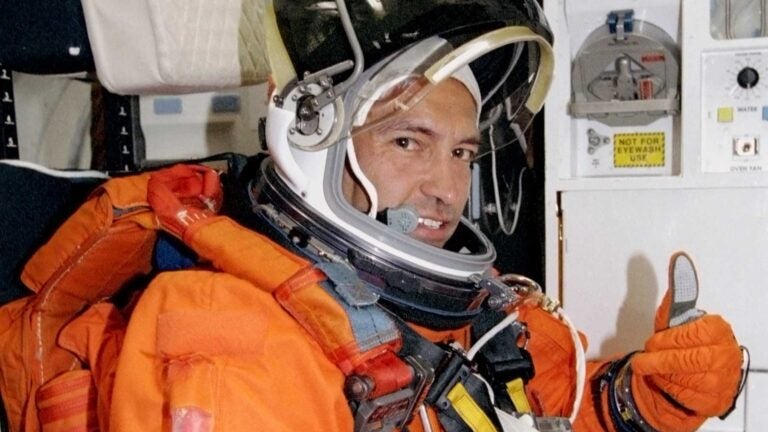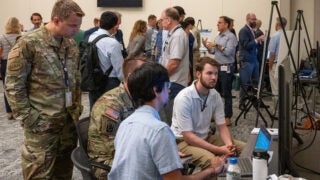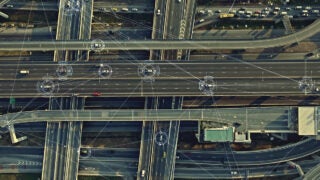
Astronaut Carlos Noriega, mission specialist, gives the thumbs-up signal during training at the Johnson Space Center. (Photo/Courtesy of NASA)
A Trojan’s view from space: Q&A with astronaut Carlos Noriega
He spent more than 500 hours in space, craving potato chips — but his priorities are down-to-earth: sharing the importance of a STEM education
Carlos Noriega ’81 knows the importance of a STEM education, one focused on science, technology, engineering and math. Born in Lima, Peru, and raised in Santa Clara, he saw his parents work hard — his father was a cabinet-maker, his mother a housekeeper — to put him in a position to attain higher education. After getting a bachelor’s degree in computer science from USC and two master’s degrees, he went on to become an astronaut and log more than 500 hours in space, including bringing power to the International Space Station ?— which he says he can see from his yard some days.
Noriega, now retired, is a featured speaker at the Preparing for the Biotech Decade event Oct. 1. He sat down for 13 questions with USC News (his answers have been edited for length and clarity).
Favorite quote?
“The only closed doors are the ones you are willing to acknowledge.” I’m not sure if anyone’s actually said that other than me. But too many people assume that there are obstacles preventing their success so they don’t even try. You will only achieve if you try.
Favorite space food?
Shrimp cocktail with extra horseradish sauce, because most food tastes a little bland.
Favorite junk food?
I like really salty, thick-cut greasy potato chips. But you can’t take those in orbit because they break up when you take a bite and float everywhere.
Last book you read?
Brain candy was great relief from the technical reading I needed to do at NASA. I’ve read the latest James Patterson, Clive Cussler, Tom Clancy or Dan Brown in the last couple weeks.
Why did you decide to be an astronaut?
It was a challenge out there that I knew I was qualified for and just needed to try. I was also drawn to be part of something bigger than myself. The need to explore is part of human nature. I wanted to be a part of that.
If you get the chance to meet families that come to the Oct. 1 Biotech event, what would you hope to pass on to them?
To never be afraid to dream of doing something big and to understand that working hard in school is the key to making those dreams come true. STEM subjects will best prepare you for a rapidly changing future.
Growing up in Peru and Southern California, your story is similar to many East and South L.A. families. Why is it important to stress STEM schooling and careers to these communities?
Too many people assume that personal achievement is tied to privilege, money, race. I can use my life story as an example for these families to understand that they too can be successful in their future endeavors if you have the right attitude.
Too many people assume that personal achievement is tied to privilege, money, race.
Carlos Noriega
We came to this country when I was 5 years old with me speaking no English. Even though my father would work two jobs to make ends meet, he would always emphasize the importance of studying hard and even pay a neighbor girl to talk to me in English so that my language skills would improve.
You’ve been in space for more than 500 hours. What’s that like?
In general, it’s terribly exciting to work in space. The biggest problem is that you will lose your stuff! It just floats away. If you’re lucky, you’ll find it by the ventilation fan inlet. But not always. So you gain a real appreciation for Velcro and duct tape.
What would you say was one of the most exciting points in your NASA career?
In 2000, my second flight [STS-97, aboard the Endeavour] gave me the opportunity to make my greatest contribution to human exploration. We prepared for over two years to conduct three space walks to install the first solar array, similar to solar panels, and radiators to the International Space Station. To this day I can step outside after sunset or before sunrise on the right days and see the shining station going by — full of astronauts and cosmonauts advancing our knowledge and experience base to allow us to move beyond low earth orbit one day.
On the flip side, can you share a low point in your career and what you learned from it?
I was supposed to be the 10th commander of the International Space Station and was training as the backup to the sixth commander. After 18 months of training, during an underwater training activity in Russia, one of the doctors noticed something unusual with my heartbeat. Even though I was eventually cured of the problem, I was permanently eliminated from long-duration spaceflight and would not be able to live on or command the International Space Station.
While grounded, I learned that I had other skills that I could apply to advance human exploration. I moved through several roles that ultimately led to being the director of safety, reliability and quality assurance for the Constellation Program. The program was making great progress toward returning to the moon and ultimately journeying to Mars. Unfortunately, it was canceled by the current administration, another great disappointment.
You have attained two MS degrees on top of your BA from USC. How has education played a role in your life and why do you think it’s important?
From early childhood, my parents emphasized the importance of doing well, actually my best, in school. Even though they had not gone to college, they made sure that I knew that the key to succeeding was doing well in school. I did so well that I was easily accepted by USC with a full Navy ROTC scholarship. There again I did well enough to finish in 3½ years.
The advanced degrees were critical to qualifying for the astronaut program. They were also important in learning how to learn again. After graduating from USC and going through flight school, all of my experiences had been operational flying. Grad school got my brain back in shape so that I was ready to learn more when I got to NASA.
What’s your dream for the future of space exploration? Anything you hope to see in your lifetime?
I hope we can return to the moon soon with a regular presence that will prepare us for the more challenging task of traveling to and working on Mars.
What are probably the biggest misconceptions people have about working in space? Most of us just know about it from movies like The Martian.
Believe it or not, it is just another work location. It is unique, but you’ve got a job to do and have thousands of people counting on you to do a good job. You are their hands, eyes, ears, etc. They are professionals who are just as dedicated to accomplishing the mission. In some cases, it might be a scientist who has dedicated years of his profession just to get a couple hours of data. If you mess up, his investment was wasted. So you do everything you can to prepare to do a good job for someone you may never have met. I can’t say enough about the thousands of trainers, flight controllers, launch controllers, engineers, maintenance technicians, etc., that make each mission a success. Astronauts tend to be the center of attention, but it is all the others who really make it a success.
Earlier, I mentioned duct tape. Well, I can recall saving at least one experiment where I used duct tape as a substitute for a broken latch. I can also remember tearing apart two laptops to move parts around to get a critical computer to work before we rendezvoused with the Russian Mir space station on my first flight. I had the pilot, Eileen Collins, at my side with some duct tape to catch and trap any little screws that might float away. So I guess I have duct tape in common with The Martian.
Is there a moment that stands out in your career?
My most memorable experience in space was on my first flight to the Russian Mir space station. We had trained for about eight months, including a week in Russia, with the cosmonauts we would work with in space. They had also spent a week in Houston. Prior to that my commander, Charlie Precourt, had spent almost a year in Russia coordinating NASA training activities in Star City. He had actually become good friends with the future Mir commander, Vasily Tsibliyev.
I still recall a memorable evening on Mir where we made some fajitas using tortillas, irradiated chicken and steak and some salsa that we had brought. While eating I remember seeing Charlie and Vasily sitting by the window watching the Earth go by laughing and joking as the best of friends.
What made this moment particularly poignant was that they had traced their military careers and discovered that not too many years earlier they had been fighter pilots on opposing sides of the inter-German border ready to go into combat against each other on a moment’s notice. We can accomplish so many things if we just work together as we did in the International Space Station program.



